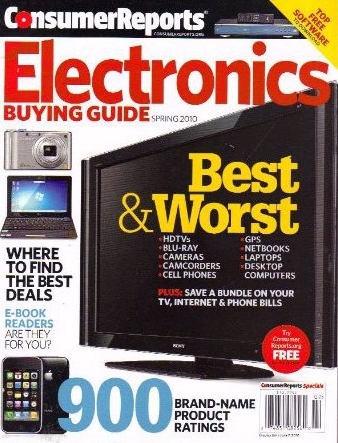
There’s been some excitement in Amazon’s Kindle forum. Consumer Reports magazine just chose the Kindle as the best e-reader in an early December issue. But I discovered that there’s even more good news for Amazon. At my local bookstore, I scoured the magazine rack, and found an even more positive comparison in the Consumer Reports Electronics Buying Guide!
And the Kindle had already won high marks in their special “Best Products of the Year” issue in November. It was the Kindle — and not the Nook or the iPad — which was listed in a special section called “Great Gifts for $250 and Under.” Consumer Reports wrote enthusiastically that the Kindle “offers crisp text, fine performance, simple controls, and a pleasurable reading experience.” It was just a short blurb — but the Electronics Buying Guide offered a very detailed comparison.
It costs a whopping $10.99 for that special Winter issue — but watch out. There’s a funny typo in its section on digital readers. They warn readers that prices typically range from $1150 to $500. Er, I’ve never seen an e-reader that costs $1150!
The guide starts with a section for people who have never seen a digital reader before, but are considering whether to buy one. (The magazine gave low marks to the experience of browsing the web on all the digital readers, calling them “very limited” and “virtually unusable”.) And they also warn shoppers to “be wary” of a reader which can’t connect to a wireless 3G network. But their biggest negative comment about the Kindle is just about file formats. (“With Kindles…Word documents and photos in JPEG format must be sent to Amazon for conversion before than can be loaded.”)
You have to flip towards the back of the magazine to find their detailed comparison table, where the Kindle was ultimately declared the winner. Consumer Reports named the Kindle DX “Best for Reading Lots of Textbooks with Diagrams,” while the newer Kindle 3G won the other honor — “Best for Most People”. Ultimately the Kindle came up with an overall score of 63 (or 65, for the larger Kindle DX). In fact, the Nook came in #3, racking up a score of just 52. In the number two position was the Sony Reader, which scored a 60, or a 56 for the smaller version. (Also tested were the BeBook, the iRex, and the Alluratek Libre.)
Of all the readers that they compared, only the Kindle received their special endorsements. The Kindle DX was listed as “Recommended,” while the Kindle 3G was awarded a “Best Buy” check mark. The Kindle scored the best for “readability” — receiving the second-highest possible score of “very good” (while the Nook’s readability was a rank lower, rated as “good” — along with every other reader.) The testers defined “readability” as which device is the easiest on your eyes.
In fact, the only two categories where the Nook scored higher than the Kindle were in “file support” and “versatility” (defined as the number of features available).The Kindle also bested the Nook in ease of navigation, page turning, and responsiveness. The Nook’s lowest score was for responsiveness — how quickly the screen becomes functional after powering up or returning from sleep mode. The Nook received the second-lowest possible ranking there, while both versions of the Kindle scored a rank higher — a middle rating of “good.” The reviewers also noted that for some users, the Kindle’s text-to-speech features could also come in handy. (They specifically mention the sight-impaired, but if you’re taking a long car trip, the Kindle could even read to you from the passenger seat!)
It’s a big deal, because Consumer Reports has been around since 1936, and I’ve always thought of it as one of the most well-respect consumer organizations. Their annual budget for testing is $21 million, according to Wikipedia.
But ironically, you still can’t read Consumer Reports on your Kindle!